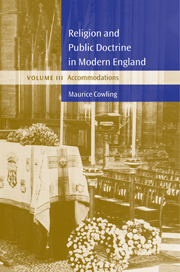Book contents
- Frontmatter
- Contents
- Foreword and acknowledgements
- Introduction
- I The Christian intellect and modern thought in modern England
- II The post-Christian consensus
- 15 Modern knowledge and the post-Christian consensus I
- 16 Modern knowledge and the post-Christian consensus II
- 17 Modern knowledge and the post-Christian consensus III
- 18 Modern knowledge and the post-Christian consensus IV
- 19 English Socialism as English religion
- 20 Literature and the post-Christian consensus
- 21 Modern knowledge and the post-Christian consensus V
- 22 Modern knowledge and the post-Christian consensus VI
- 23 Judaism and the post-Christian consensus
- III Conclusion: religion and public doctrine in modern England
- Notes
- Index of proper names
22 - Modern knowledge and the post-Christian consensus VI
Published online by Cambridge University Press: 23 December 2009
- Frontmatter
- Contents
- Foreword and acknowledgements
- Introduction
- I The Christian intellect and modern thought in modern England
- II The post-Christian consensus
- 15 Modern knowledge and the post-Christian consensus I
- 16 Modern knowledge and the post-Christian consensus II
- 17 Modern knowledge and the post-Christian consensus III
- 18 Modern knowledge and the post-Christian consensus IV
- 19 English Socialism as English religion
- 20 Literature and the post-Christian consensus
- 21 Modern knowledge and the post-Christian consensus V
- 22 Modern knowledge and the post-Christian consensus VI
- 23 Judaism and the post-Christian consensus
- III Conclusion: religion and public doctrine in modern England
- Notes
- Index of proper names
Summary
The ‘aesthetic’ is too valuable to be surrendered without a struggle to the bourgeois aestheticians, and too contaminated by that ideology to be appropriated as it is. It is, perhaps, in the provincial, strategic silence of those who refuse to speak ‘morally’ and ‘aesthetically’ that something of the true meaning of both terms is articulated.
(T. Eagleton, Criticism and Ideology, 1976, p. 187)The one vital lesson which the nineteenth century had to learn … was that the basic economic organization could not be separated and excluded from its moral and intellectual concerns … Others besides Marx insisted on this, and worked towards it, but Marx, in giving a social and historical definition to the vaguer idea of ‘industrialism’, made the decisive contribution. The materials for restoring a whole and adequate consciousness of our common life were given into our hands.
(Raymond Williams, Culture and Society 1780–1950, 1958, p. 271)The scientific attempt to explore the depth of human things is accompanied by a singular danger. For it threatens to destroy our response to the surface. Yet it is on the surface that we live and act: it is there that we are created, as complex appearances sustained by the social interaction which we, as appearances, also create. It is in this top-soil that the seeds of human happiness are sown, and the reckless desire to scrape it away – a desire which has inspired all those ‘sciences of man’, from Marx and Freud to sociobiology – deprives us of our consolation. Philosophy is important, therefore, as an exercise in conceptual ecology. It is a lastditch attempt to ‘save the appearances’.
(Roger Scruton, Modern Philosophy, 1994, p. 244)- Type
- Chapter
- Information
- Religion and Public Doctrine in Modern England , pp. 594 - 633Publisher: Cambridge University PressPrint publication year: 2001

